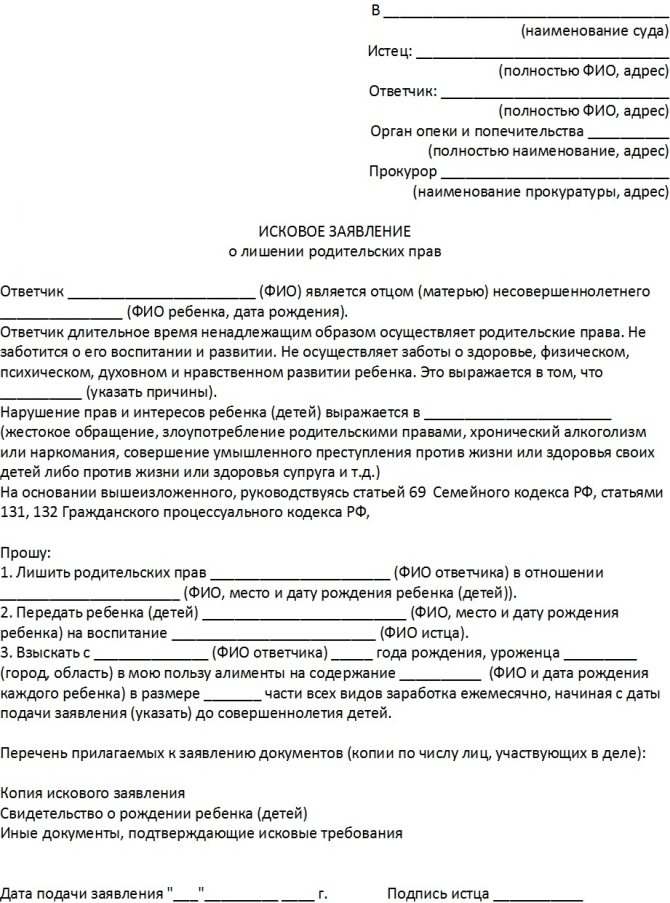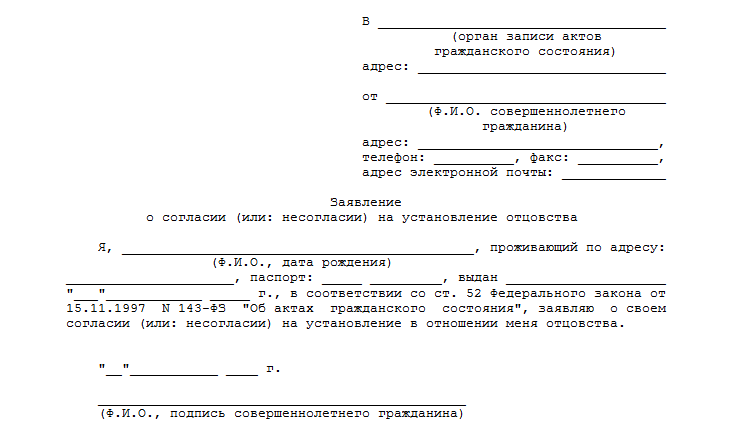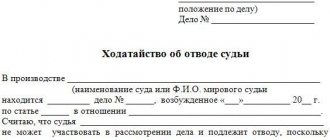Home / Parents' rights / How to unilaterally deprive paternity without the father's consent
- FREE for a lawyer!

By submitting data you agree to the Consent to PD Processing, PD Processing Policy and User Agreement.
Anonymously
Information about you will not be disclosed
Fast
Fill out the form and a lawyer will contact you within 5 minutes
Sometimes men ask lawyers a question: how to renounce paternity? They are looking for ways to relieve themselves of the burdensome obligations of raising and maintaining children, and to get rid of forced communication with the child’s mother.
But most often, it is mothers, and not fathers, who resort to such a categorical measure as deprivation of paternity, regardless of the father’s wishes.
Is it possible to deprive paternity without the father's consent? In this article we will not only answer this question, but also consider the procedure, methods and legal consequences of such a decisive step.
In what cases can paternity be deprived?
When we talk about deprivation of paternity, we mean the procedure for depriving parental rights provided for in Art. 69, , Family Code of the Russian Federation.
The essence of this procedure is to remove from the process of raising a child the parent who does not fulfill parental responsibilities properly, evades caring for the child, leads a reprehensible lifestyle and negatively affects the physical and mental development of his son or daughter.
As is clear from the above, deprivation of parental rights is an extreme measure that is used in exceptional cases.
Question After the divorce, the husband completely ceased to be interested in the life of the child. Doesn't spend time with him, doesn't call, doesn't wish him happy birthday. There is no talk of monetary assistance. I don’t know where he is now. Is it possible to deprive an ex-husband of paternity without his participation?
Answer
It is not necessary to obtain the consent of your ex-husband in order to deprive him of parental rights. It is enough that there are good reasons for this, provided for by law (Article 69 of the RF IC).
The reasons that force mothers to sue for deprivation of paternity and the grounds for deprivation of paternity are not exactly the same thing.
The reasons may include the following circumstances:
- Travel of mother and child abroad. In order for a mother and child to freely travel outside the country, it is necessary to obtain the father’s permission. Sometimes, after a divorce, fathers deliberately refuse to give permission for such trips, and mothers have no choice but to look for a reason to deprive them of paternity.
- Freeing a child from the obligation to support a weak and needy father. A father who has reached old age or is seriously ill has the right to claim financial support from his adult son or daughter. If the mother cannot prove that the father himself avoided providing support to his own children in every possible way, they will really have to support the father. To avoid this, mothers decide to deprive the father of parental rights - then he will not be able to obtain alimony from the children.
- Remarriage of the mother and adoption of the child by another man. Often, after a divorce, the mother remarries, and the new chosen one agrees to care for, raise, and support her child. Depriving the father of parental rights and adoption seems to be a completely appropriate solution.
Grounds for deprivation of paternity
Even if the mother has good reasons to remove the father from the child’s life, this does not mean that the court will deprive the father of parental rights. Before filing a lawsuit, it is important to make sure that there are legal grounds for terminating parental rights.
The list of grounds - complete and exhaustive - is provided for in Art. 69 RF IC);
- a crime committed by the father against the child himself or other close relatives;
- failure to fulfill parental responsibilities to a child;
- refusal of the father to provide financial support or support the child (that is, malicious non-payment of alimony);
- alcoholism or drug addiction;
- harshness and violence (physical, sexual, moral) towards the child;
- leaving the child in a medical institution.
Expert opinion
Semyon Frolov
Lawyer. 7 years of experience. Specialization: family, inheritance, housing law.
The more often the father committed misconduct, the more rude and malicious his inaction or deliberate cruelty towards the child was, the easier it will be for the mother to convince the court of the importance of depriving him of paternity.
The consent of the father himself to the deprivation of parental rights is of no small importance. If he does not object (and especially if he signs and provides the court with a written waiver of paternity in advance), the process of depriving parental rights will be even simpler and faster.
The difference between challenging paternity and depriving parental rights
Many mothers, speaking about deprivation of paternity, mistakenly understand it as challenging paternity, that is, confirming the absence of a related relationship between the child and the father.
However, these are two different procedures that have similarities and differences: in grounds, procedure, legal consequences.
| Deprivation of parental rights | Challenging paternity | |
| Reasons | A father can be deprived of parental rights solely on grounds, a complete and closed list of which is contained in the law (Article 69 of the RF IC): - cruelty; - abandonment of a child; - alcoholism or drug addiction; — failure to fulfill parental responsibilities, including the obligation to support a child; — abuse of parental rights; - a crime against a child or other close relatives. | Paternity can be challenged on the basis of the absence of a relationship between the parent and the child, which must be properly proven (with the help of medical examinations, documents, photographs, letters, testimony). The exception is cases where the father voluntarily acknowledged paternity, knowing that the child is descended from him (including cases of surrogacy or IVF). It is no longer possible to refuse or challenge paternity established under such circumstances (Article 52 of the RF IC). |
| Procedure | Both procedures - deprivation of the father's parental rights and challenging paternity - occur exclusively in court (after filing a statement of claim and supporting documents with the court). | |
| Legal consequences | After a court decision is made, the father loses all rights in relation to the child (to raise, see, take part in the life of the child, to be the legal representative of the child, to receive maintenance and inheritance from the child), but is not released from parental responsibilities: - support the child until adulthood; - to be a testator of the first priority according to the law (Article 71 of the RF IC). | After challenging paternity, the father loses not only his rights (similar to deprivation of parental rights), but also his responsibilities towards the child. In particular, he is also relieved of the obligation to support the child - after the court decision enters into legal force. The return of alimony paid during legal paternity is not expected (Article 116 of the RF IC). The child will also not be able to inherit the father’s property after his death. |
If you have reason to suspect that the child is not descended from the man recorded as the father, you can challenge his paternity. You can read more about this in our article “Statement of Claim to Challenge Paternity.”
Three court hearings and interrogation of guardianship authorities
To deprive parental rights, my words that the father is not involved in raising children are not enough; they need to be supported by documents. Here's what I collected:
- a certificate from the school stating that I was the only one involved in the education of the children: I dropped them off and picked them up from school, communicated with teachers and went to meetings;
- certificate from the clinic: the doctor confirmed that the children are only with me during examinations;
- certificate from the executive service: they usually provide a certificate of alimony debt for the last six months, but we asked for a calculation of the total debt.
I didn’t go to court, a lawyer did that. This is more convenient, because the meeting may be postponed or you will have to wait several hours for it to start. The ex-husband was also not in court: it turned out that just at that time he checked out of the apartment, but did not register in the new one, and formally letters from the court did not reach him. Although mutual friends told me that he knew about the lawsuit.
Despite the fact that the defendant did not come to court, the deprivation procedure took place. The first meeting lasted about five minutes: representatives of the guardianship did not show up.
On the second, the children were sent for a psychological examination. It is prescribed to children over five years of age to find out how attached they are to the other parent. My daughters were with the psychologist for about half an hour, drawing and answering questions. The examination showed that the eldest daughter is not attached to her father, and the youngest misses him.
Then I was called to the city administration for a commission with the guardianship authorities. There was a large round table with about ten people participating. For some reason they were afraid that I came with a lawyer and asked him to leave, but I did not agree - it was calmer with a lawyer.
The commission asked why I wanted to deprive my father of his rights. I answered as it was written in the statement: he does not communicate with children, does not pay child support - I had evidence of all this. I saw that the guardianship didn’t really trust me, but I couldn’t do anything about it. At some point, I burst into tears and expressed everything as it is: that my ex drinks, lies around drunk on the street, periodically tries to break down the door to our apartment, and then sleeps in the entrance. I told him how afraid I was that his legs would be amputated, and my children would have to support him in his old age. That all this is already sick of me, and I can’t even call the police when he comes, because according to the documents he is the father and has the right to see the children.
My emotional speech touched the members of the commission, but they asked for confirmation: a certificate from the drug dispensary that my husband is an alcoholic, or from the police that they picked him up drunk from the street.
I could not collect such papers: the former was not registered with the drug dispensary, the police issue certificates only by court decision. Then I turned to the neighbors. They wrote in any form that they had repeatedly seen my ex-husband drunk in the entrance and that sometimes he sleeps under a tree.
I couldn’t go to the next meeting of the commission because of work; the lawyer was there alone. He presented testimony from neighbors, certificates from school and clinic, and the commission decided that I had enough grounds to deprive my father of parental rights.
At the third court hearing, the lawyer brought the decision of the guardianship authorities and fifteen minutes later received a decision that my ex-husband was deprived of parental rights. The whole process took four months.
Procedure for deprivation of paternity
Let's consider what needs to be done to achieve deprivation of paternity?
Who can deprive paternity?
The circle of persons who can file a claim for deprivation of paternity is clearly specified in the legislation (Article 70 of the RF IC).
These include:
- Child's mother;
- Guardian/trustee of the child (it is important that the relative who cares for the child has the legal status of guardian or trustee);
- Representative of the guardianship or trusteeship authority;
- A representative of the institution where the child is located;
- Representative of the prosecutor's office (division for minors).
Sometimes a mother cannot start a trial on her own because she is in difficult life circumstances, fears the child’s father, or is condemned by relatives or friends. In this case, she can seek mediation - to the local guardianship and trusteeship authority or the prosecutor's office.
Step-by-step action plan
The procedure for depriving paternity may seem so complicated that a logical question arises: where to start? Let's consider a step-by-step action plan:
- Legal advice.
- Consultation with the prosecutor/representative of the guardianship and trusteeship authority;
- Preparation of a statement of claim;
- Collection of evidence and other documents that are attached to the claim;
- Filing a claim with a judicial authority;
- Receiving notification of the date and time of the first (and subsequent) court hearing;
- Attending court hearings: presenting arguments, submitting additional evidence, motions, petitions, objections;
- Obtaining a court decision on deprivation of parental rights.
Statement of claim
The statement of claim for deprivation of paternity is the main document that will be considered by the court.
Expert opinion
Dmitry Nosikov
Lawyer. Specialization: family and housing law.
It must accurately, completely, and reasonably set out all the circumstances on which the mother (guardian or trustee) relies as arguments and grounds for depriving the father of parental rights. It is not recommended to give arguments or describe circumstances that are not relevant to the case, to use rude expressions, to make inaccuracies, mistakes, or ambiguous formulations. A claim containing such shortcomings may be returned to the plaintiff for revision, which will delay the already slow legal process.
The structure and content of the statement of claim are strictly regulated (Article 131 of the Code of Civil Procedure of the Russian Federation).
Please provide the following information in your claim:
- A cap:
- name, address of the court;
- Full name, address of the plaintiff;
- Full name, address of the defendant;
- name and address of the guardianship and trusteeship authority, full name representative;
- name and address of the prosecutor's office, full name prosecutor;
- Title : “Statement of claim for deprivation of parental rights”;
- Descriptive part of the claim:
- How was the relationship between mother and father (marriage and divorce, cohabitation);
- When the joint children were born, full name, date of birth, residential address at the time of filing the claim;
- Description of the circumstances that serve as the basis for deprivation of parental rights, description of illegal actions or inaction on the part of the father, link to supporting documents, testimony;
- Rationale: how will deprivation of parental rights affect the physical and moral development of the child;
- Reference to legal provisions (Article 69, RF IC);
- Claim:
- deprive the father of parental rights,
- collect child support from the father deprived of parental rights;
- List of applications;
- Date of;
- Signature.

Documentation
All information that is mentioned in the statement of claim, to which the plaintiff refers as arguments or evidence, must be documented (Article 132 of the Code of Civil Procedure of the Russian Federation).
Main documents:
- Plaintiff's passport;
- Power of attorney (if the claim is filed by a representative of the institution);
- Child's birth certificate;
- Marriage/divorce certificate;
- Certificate of family composition at the place of residence;
- An act of checking the living conditions at the child’s place of residence.
In addition, documents must be attached to the claim that confirm the existence of grounds for depriving the father of parental rights. The law does not contain an exact list of documents that can be attached to a claim as evidence, since this list entirely depends on the circumstances of the case.
Additional documents:
- If the father used violence, cruelty, or committed a crime against the child or other close relatives:
- medical certificates confirming injuries or mutilations, sexual assault;
- protocol on detention, arrest, initiation of administrative or criminal proceedings;
- court sentence;
- witness's testimonies;
- photos;
- video recordings;
- If the father has evaded paying child support for a long time:
- court decision to collect alimony;
- voluntary written agreement on the payment of alimony;
- certificate from the bailiff about the amount of debt;
- certificate from the father’s place of work about the amount of wages;
- tax returns, documents confirming the father’s income and expenses;
- receipts for expenses for the child's needs;
- If the father refuses to participate in raising the child:
- a certificate from the school or preschool that the child attends;
- characteristics of the child of a school or preschool employee (with information about which parent takes the main part in the upbringing and development of the child);
- a certificate from a medical institution (with information about which parent takes care of the child’s health, calls a doctor during illness, accompanies him in the hospital, takes him to preventive procedures, and bears the costs of treatment);
- characteristics of the child from sports sections, clubs, courses that he attends;
- witness's testimonies;
- If the father abuses alcohol or is addicted to drugs:
- a certificate from a drug dispensary confirming registration;
- protocol on detention, arrest, initiation of administrative or criminal proceedings;
- witness's testimonies;
- court decision prohibiting driving a vehicle;
- documents confirming completion of rehabilitation.
All documents, including the statement of claim, are submitted to the court in as many copies as there are persons participating in the trial:
- for court;
- for the defendant (father);
- for a representative of the guardianship and trusteeship authority;
- for the prosecutor.
Another copy (with the court’s mark on acceptance of the claim) remains with the plaintiff.
Jurisdiction
Unlike other family disputes, which can be successfully considered in a magistrate's court, claims for deprivation of paternity are authorized to be considered exclusively by courts of general jurisdiction - city, district (according to paragraph 4 of Article 23, Code of Civil Procedure of the Russian Federation).
Expert opinion
Semyon Frolov
Lawyer. 7 years of experience. Specialization: family, inheritance, housing law.
Where to contact? As a general rule, you must go to court at the place of residence of the defendant, that is, the father, who should be deprived of parental rights. But sometimes difficulties arise in connection with this - the father lives too far away or the father’s whereabouts are not known at all.
According to paragraph 1 of Art. 29 of the Code of Civil Procedure of the Russian Federation, you can file a claim at the last location of the defendant known to you or at the location of his property (for example, residential real estate). According to paragraph 3 of Art. 29 of the Code of Civil Procedure of the Russian Federation, you can file a claim at your own place of residence if, simultaneously with the deprivation of parental rights, you decide to collect child support - in one lawsuit.
Expenses and state fees
If the claim is filed in the interests of a minor child, the plaintiff is exempt from paying the state fee (according to paragraphs 9, 15 paragraph 1 of Article 333.36 of the Tax Code of the Russian Federation).
You may have to pay other costs associated with the lawsuit, such as postage or transportation costs, legal fees for preparing your claim, or representing you in court.
Procedure
The peculiarity of the procedure for deprivation of parental rights is that representatives must be involved in participation in the trial...
- Guardianship and trusteeship authority
- Prosecutor's office.
The responsibilities of these officials include monitoring compliance with the legal rights of a child whose father is deprived of parental rights.
During the trial, the court listens to the arguments of all parties, considers all evidence presented, requests additional evidence, invites and hears witnesses.
If necessary, the court may order a forensic examination (for example, to establish the child’s attachment (if, simultaneously with the deprivation of parental rights, the issue of the child’s future place of residence is being decided). If the child is already 10 years old, the court will ask him a question about who he wants to live with , and will definitely take the answer into account.
Based on the results of the proceedings, the court makes and announces a decision to the parties.
Deadlines
Although the law limits the period for consideration of family disputes to 2 months (in district and city courts), in reality the trial can be significantly delayed due to...
- return the claim and documents to the plaintiff for revision or correction of deficiencies;
- postponement of a court hearing due to the failure of the plaintiff or defendant to appear (if he did not apply for consideration of the case without his presence);
- filing by the parties and consideration by the court of petitions, objections, counterclaims;
- appointment and conduct of examination;
- request by the court for additional documents;
- invitation and hearing of witnesses.
In addition, cases of deprivation of parental rights are complex, so you should not expect a quick and easy result.
Within 1 month after the court decision is made, it can be appealed by the plaintiff or defendant if it seems unfair. After the expiration of this period, the court decision enters into legal force, and all legal consequences of the court decision provided for by law occur for the parties.
Where to begin
By 2015, I had accumulated enough reasons to deprive my ex-husband of parental rights: he had not paid child support for four years, visited the children once every three months, and was often drunk. Then I decided to file a statement of claim. I downloaded the first sample I came across from the Internet, remade it for myself and showed it to a lawyer I knew. The lawyer was a family friend and agreed to take on the case and handle it to gain experience. In response, I had to pay him 5,000 rubles - despite the fact that usually the services of a lawyer on such issues cost 30,000 - 50,000 rubles. We entered into an agreement so that a friend could represent my interests in court, and we got down to business.
First, we rewrote the statement of claim. I can't show you what it looked like in the end because I only saved a draft. This draft can be used.
Here's what you need to write:
- To whom the application is sent: to such and such a court in such and such a district. You can file a claim at the defendant’s place of residence, and if it is not known where he lives, then at the last address where he was registered.
- Who is the plaintiff - first name, last name, address, telephone number.
- Who is the defendant - first name, last name, address, telephone number, if known.
- Who can assess the merits of the dispute - the guardianship authorities of the district where the child lives.
- The essence of the claims is to tell in your own words how everything happened, but without emotional statements: they lived married (or not married), have children, does not pay child support, does not communicate with children.
The application can be handwritten or typed. The following documents must be attached to it:
- copy of passport,
- copies of children's birth certificates,
- copy of TIN,
- court decision on alimony.
My lawyer and I sent the claim, along with copies of documents, to the court, and we ourselves began collecting evidence.
Is child support paid when paternity is terminated?
Deprivation of parental rights and collection of alimony are interconnected.
Even if the mother (guardian, trustee, representative of the guardianship authority, prosecutor) did not ask the court to collect alimony from the father, who is deprived of parental rights, the court is obliged to consider and resolve the issue of further maintenance of the child (Clause 3 of Article 70 of the RF IC).
In addition, family law directly establishes that after deprivation of rights, the father is not released from fulfilling parental responsibilities towards the child (clause 3 of Article 71 of the RF IC), in particular, the obligation to financially support the child.
The amount of alimony can be determined...
- as a percentage of the father’s earnings (Article 81 of the RF IC);
- in a fixed amount of money depending on the needs of the child and the capabilities of the father (Article 83 of the RF IC).
If the court has previously made a decision to collect alimony, it is not necessary to bring this issue up for consideration by the court again. The exception is when there has been a change...
- the father’s financial or marital status (for example, other children were born);
- the child’s needs (for example, health status has deteriorated).
In this case, the court may revise the previously made decision to collect alimony in the direction of increasing or decreasing the amount of payments (Article 119 of the RF IC).
How to achieve payment of child support after deprivation of parental rights?
First of all, the father can pay child support voluntarily. If the father evades payment, based on a court decision, the mother (guardian or trustee) can receive a writ of execution, which must be submitted to the administration at the father’s place of work or to the Bailiff Service for forced collection of alimony payments.
What documents need to be prepared?
In cases where paternity is established voluntarily, the child’s parents will need to provide the following documents to the local state registration authorities:
- identification document (passport);
- a notarized document, in the absence of one of the parents;
- the consent of the child upon reaching the age of majority (you can find out how to adopt an adult and whether it is possible in Russia to change the family status of an already adult “child” here);
- a certificate from the antenatal clinic if adoption occurs during pregnancy;
- if adoption occurs after the child is registered, a birth certificate is required;
- statement established by Government Decree No. 1274 of October 31, 1989;
- check for payment of state duty.
This is what the application form for a child’s consent to establish paternity looks like when he reaches the age of majority:

A slightly different package of documents will be required for the adoptive parent if the child does not have a mother for some reason.
To do this, the potential father must have:
- identification document (passport);
- birth document of the adoptee;
- if the child’s mother is not alive, then a death certificate is needed;
- if the mother improperly fulfills her duties and is deprived of parental rights, then in this case a court decision will be required to recognize her deprivation of rights;
- consent of the competent authorities (guardianship) for adoption.
If paternity is established in court, the list of documents is approved on an individual basis . We list only the necessary ones:
- statement of claim;
- document confirming the birth of the child;
- the opinions of witnesses and material evidence indicating the relationship between the father and the child;
- check for payment of state duty.
Read more about what documents are needed to adopt a child and where to start this process here.
Legal consequences
The very concept of “deprivation of parental rights” is quite clear and unambiguous: the father loses all rights in relation to his son or daughter that previously belonged to him:
- to raise a child,
- see the child
- take care of the healthy physical, mental and moral development of the child,
- be the legal representative of the child, protect his legal rights and interests,
- allow or prohibit the child from leaving the country,
- allow or prohibit changing the child’s first and last name,
- receive a pension, benefit, social benefits related to parenthood,
- receive alimony for your own maintenance in case of incapacity or need (clause 5 of article 87 of the RF IC),
- receive an inheritance after the death of a child,
- be a guardian or trustee of other children.
At the same time, the child retains the right to use residential premises belonging to the father, the right to receive monetary support, and the right to inherit the father’s property after his death as the primary heir by law.
Arbitrage practice
Such a measure as deprivation of paternity is considered an extreme measure in family law. Courts resort to this measure only in the most exceptional cases, when it is necessary to protect a child from cruel, perverted, dangerous actions or malicious inaction, neglect on the part of the father.
Example 1 The city court of Tikhvin, Leningrad Region, considered the claim of Morozova P. for the deprivation of parental rights of Varlamov A. in relation to her 5-year-old daughter, Varlamova O.
In the lawsuit, the plaintiff stated that the defendant admitted paternity voluntarily. But living together after the birth of the child lasted only six months, after which the family broke up. At the moment, the defendant is avoiding raising his daughter in every possible way, does not participate in the costs of her maintenance, and does not express a desire to see each other and spend time together.
The defendant sent a petition to the court to consider the case without his presence and asked the court to satisfy P. Morozova’s claims for deprivation of his parental rights.
After studying the case materials, having heard the assistant prosecutor and a representative of the guardianship authority, the court found that Varlamov A.’s evasion of parental responsibilities for raising, maintaining his daughter, caring for her health and development is grounds for deprivation of parental rights in accordance with Art. 69 RF IC. The court granted the claim.
Example 2 The City Court of Frolov, Volgograd Region, considered the claim of Tikhova A. for the deprivation of parental rights of Tikhov V. in relation to the 12-year-old son of Tikhov P.
The plaintiff argued her claims by saying that after the divorce, her ex-husband V. Tikhov removed himself from the child’s life, did not take part in his upbringing, and did not provide adequate financial support.
The representative of the defendant did not recognize the claim and said that Tikhov V. does not participate in raising his son for good reasons: he lives at a considerable distance, is sick, has limited financial capabilities, and in addition, in addition to the son from his first marriage, Tikhov P. is in his care a young daughter from her second marriage who suffers from a congenital disease. At the same time, V. Tikhov does not shy away from paying alimony, and is gradually paying off the resulting debt.
Having considered the case materials, having heard the parties, witnesses, representatives of the guardianship authority and the prosecutor’s office, the court made a decision to refuse to satisfy the claims of Tikhova A.
Results. Legal advice
So, deprivation of paternity is a measure aimed at protecting the child from unlawful actions or inaction on the part of the father. Only a court can deprive a person of paternity - on grounds a full list of which is contained in the law.
The procedure for a mother who has decided to deprive her father of parental rights involves, first of all, careful preparation:
- drawing up a legally competent and reasoned claim
- collecting evidence confirming the importance of removing the father from the child’s life,
secondly, responsible, punctual, confident participation in court hearings, the date and time of which she will receive subpoenas.
Expert opinion
Dmitry Nosikov
Lawyer. Specialization: family and housing law.
You may well be able to cope with these tasks on your own - based on the recommendations outlined above, a ready-made sample claim prepared by our lawyers, and a list of necessary documents.
But if you need help or advice, you can ask our lawyer a question and get a free consultation.
We will help you prepare for the trial and protect the rights of the child in court. Attention!
- Due to frequent changes in legislation, information sometimes becomes outdated faster than we can update it on the website.
- All cases are very individual and depend on many factors. Basic information does not guarantee a solution to your specific problems.
That's why FREE expert consultants work for you around the clock!
- via the form (below), or via online chat
- Call the hotline:
- Moscow and the Region
- St. Petersburg and region
- FREE for a lawyer!
By submitting data you agree to the Consent to PD Processing, PD Processing Policy and User Agreement.
Anonymously
Information about you will not be disclosed
Fast
Fill out the form and a lawyer will contact you within 5 minutes
Tell your friends
Rate ( 1 ratings, average: 5.00 out of 5)
Author of the article
Irina Garmash
Family law consultant.
Author's rating
Articles written
612











